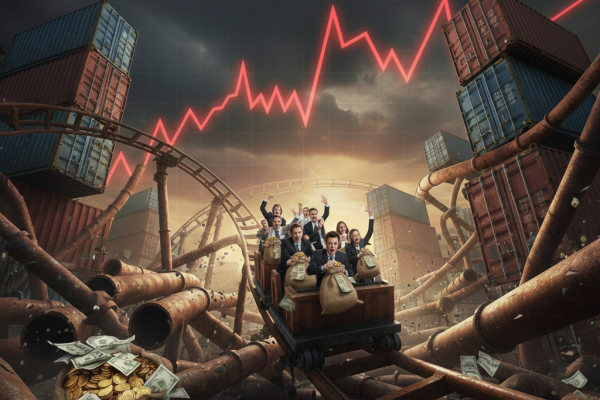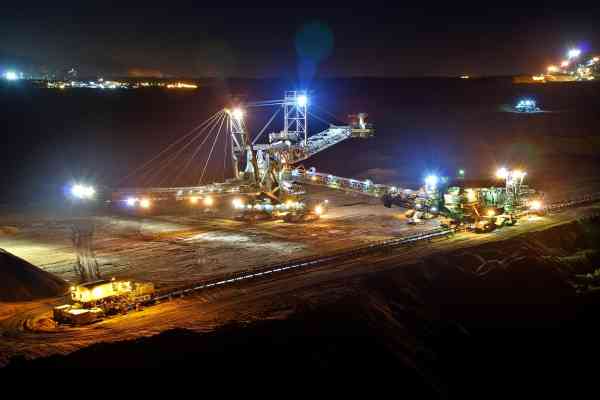August 2nd, 2021 | 11:39 CEST
Royal Dutch, Saturn Oil & Gas, BP: Finding the right oil pearl!
The global economy is slowly regaining momentum, although there is still a risk from the Corona pandemic. The Association of Petroleum Exporting Countries and its partner countries (OPEC+) have agreed to significantly increase oil production as the global economy recovers. Starting in August, the oil alliance will increase its daily output by 400,000 barrels each month until further notice. If market conditions permit, the current production cut will expire in September 2022. As prices have so far remained well above USD 70, oil is obviously in demand. So the industry seems to be running at full speed again. Where are the opportunities for investors?
time to read: 5 minutes
|
Author:
André Will-Laudien
ISIN:
ROYAL DUTCH SHELL A EO-07 | GB00B03MLX29 , SATURN OIL+GAS O.N. | CA80412L1076 , BP PLC DL-_25 | GB0007980591
Table of contents:

"[...] China's dominance is one of the reasons why we are so heavily involved in the tungsten market. Here, around 85% of production is in Chinese hands. [...]" Dr. Thomas Gutschlag, CEO, Deutsche Rohstoff AG
Author
André Will-Laudien
Born in Munich, he first studied economics and graduated in business administration at the Ludwig-Maximilians-University in 1995. As he was involved with the stock market at a very early stage, he now has more than 30 years of experience in the capital markets.
Tag cloud
Shares cloud
Royal Dutch Shell - Dividend increase and share buyback announced
At the start of the Corona pandemic in 2020, the OPEC+ alliance had cut daily production by around 9.7 million barrels. This succeeded in supporting oil prices, which had fallen sharply due to the slump in the global economy. In the meantime, the oil tap has been gradually turned back on. The production cut now stands at around 5.7 million barrels a day. Thanks in part to the production limit, the price of crude oil has risen by approximately 40% since the beginning of the year. OPEC expects global oil demand to return to pre-Corona levels in 2022. That would mean a demand of around 100 million barrels a day, 45% of which is supplied by the cartel.
One of the largest private oil companies is the British-Dutch Royal Dutch Shell. In the last quarter, Royal Dutch Shell showed its old strength again with a profit in the billions. In keeping with tradition, the Company is allowing its shareholders to share in this success. The dividend is being increased again, and a USD 2 billion share buyback is on the agenda. Due to the drop in oil prices last year, Shell had also cut its dividend for the first time since World War II. However, the general conditions for the oil industry have changed permanently. Today, the public expects oil multinationals to operate responsibly and change their business models to be more environmentally friendly and innovative to satisfy the world's hunger for energy.
With the rise in oil and gas prices, Shell is now clearly back in the black, even though the supply chains that have been disrupted since the pandemic still do not allow for the old sales levels. However, net income has already turned around from minus USD 18 billion to plus USD 3.4 billion, which means Shell can start thinking about debt repayment again. The A-share of the oil giant could smoothly double from the October low and has now been consolidating at a high level for 4 months. The dividend yield is currently 3.6% again after the adjustment. This makes Royal Dutch a basic investment again.
Saturn Oil & Gas - A brand new player in the oil market
Canadian oil producer Saturn Oil & Gas, based in Saskatchewan, has done the double ride. Last year, no one wanted to invest in oil because of the emerging pandemic, but little Saturn seized the moment and probed the Canadian market for suitable expansion opportunities. At the time, no one thought out loud that the result would be an oil company with 20 times the output.
Saturn Oil & Gas landed a historic deal in May 2021 and took over the Oxbow property, which at 6700 barrels of daily production is 20 times as large. Leading the way, of course, was the perpetually low WTI price in 2020, between USD 30 and USD 50 per barrel. This enabled the discounting models to arrive at a moderate purchase price, which has now been translated into reality in mid-2021. The completed acquisition has turned Saturn Oil & Gas into a completely new company, with high cash flows and a permanent ability to self-finance projects.
Year after year, the acquisition costs of CAD 93 million are being paid off according to plan, and complete debt relief could be on the cards as early as mid-2023. 378 drilling locations are waiting to be developed, which is an increase of 180% compared to the previous pipeline of projects. Since, in addition to the investments in the production systems, the infrastructure has also developed very well in recent years, the opening of new drilling sites is now taking place very efficiently and quickly. Declining production rates in older fields can thus be rapidly overcompensated with little effort.
The medium-term plan envisages production rates of 8,000 BPD (barrels per day); the current oil-to-gas ratio is 95 to 5. This production rate will reduce debt by CAD 70 million by the end of 2022, or 60% of current borrowings. A significant part of the financial planning is based on forward sales, so the occurrence of the quantum leap in the balance sheet is already easily predictable.
Saturn Oil & Gas management makes it clear that they now see themselves in the active role of industry consolidation and always keep an eye on suitable additions. In recent weeks, the stock market had priced in the financing details, but investors have probably not yet recognized the new value. This is because both the sum-of-the-parts valuation and the discounting of future cash surpluses provide an intrinsic value per share of CAD 0.40-0.50. Thus, those currently ordering can quietly collect a 75% discount on NAV with high daily liquidity. The analytical valuation gap should then also close in 2021.
British Petroleum (BP) - BREXIT slowly making itself felt
Unfortunately, things are not going so well for the British oil multinational BP. The STOXX 50 value was one of the biggest index losers of the last 4 weeks. The reason was certainly the expansion of production volumes by the OPEC+ association and the slightly declining oil price in July. The situation has been looking somewhat better again for a few days, as oil prices recently received a slight boost from a weaker dollar. The US currency reacted to indications from the US central bank Fed, according to which low interest rates can no longer be expected in the long term due to the current inflation dynamics.
After a very good first quarter, BP is likely to have a number of negative factors lurking on the horizon again. This is because the BREXIT is now having an impact on the balance sheets of major British companies. The energy group has had to temporarily close some service stations in the UK due to a shortage of truck drivers due to unresolved visa and customs issues. In addition, the industrial supply chains for petroleum products have also been strained because several employees have had to remain in quarantine due to contact with people infected with Corona. Companies and authorities are now at the limits of their capacity. The United Kingdom is experiencing the full force of the fourth wave of the pandemic with a sharp rise in the number of infections.
BP is expected to look at its books on August 3, 2021. It will be interesting to see with which measures large corporations react to the changed rules with the EU and how negatively the excessive bureaucracy affects their balance sheets. The pandemic further exacerbates these points. BP shares reached their high in June at EUR 3.94 and have since consolidated by 15%. Due to the heightened uncertainties, one should currently rather stand on the sidelines.
The oil stocks considered here offer a spectrum of large and small in the international oil business. In the case of multinationals, the result is driven by many political and public issues, and Saturn Oil & Gas is a new star in the commodity sky.
Conflict of interest
Pursuant to §85 of the German Securities Trading Act (WpHG), we point out that Apaton Finance GmbH as well as partners, authors or employees of Apaton Finance GmbH (hereinafter referred to as "Relevant Persons") may in the future hold shares or other financial instruments of the mentioned companies or will bet on rising or falling on rising or falling prices and therefore a conflict of interest may arise in the future. conflict of interest may arise in the future. The Relevant Persons reserve the shares or other financial instruments of the company at any time (hereinafter referred to as the company at any time (hereinafter referred to as a "Transaction"). "Transaction"). Transactions may under certain circumstances influence the respective price of the shares or other financial instruments of the of the Company.
Furthermore, Apaton Finance GmbH reserves the right to enter into future relationships with the company or with third parties in relation to reports on the company. with regard to reports on the company, which are published within the scope of the Apaton Finance GmbH as well as in the social media, on partner sites or in e-mails, on partner sites or in e-mails. The above references to existing conflicts of interest apply apply to all types and forms of publication used by Apaton Finance GmbH uses for publications on companies.
Risk notice
Apaton Finance GmbH offers editors, agencies and companies the opportunity to publish commentaries, interviews, summaries, news and etc. on news.financial. These contents serve information for readers and does not constitute a call to action or recommendations, neither explicitly nor implicitly. implicitly, they are to be understood as an assurance of possible price be understood. The contents do not replace individual professional investment advice and do not constitute an offer to sell the share(s) offer to sell the share(s) or other financial instrument(s) in question, nor is it an nor an invitation to buy or sell such.
The content is expressly not a financial analysis, but rather financial analysis, but rather journalistic or advertising texts. Readers or users who make investment decisions or carry out transactions on the basis decisions or transactions on the basis of the information provided here act completely at their own risk. There is no contractual relationship between between Apaton Finance GmbH and its readers or the users of its offers. users of its offers, as our information only refers to the company and not to the company, but not to the investment decision of the reader or user. or user.
The acquisition of financial instruments entails high risks that can lead to the total loss of the capital invested. The information published by Apaton Finance GmbH and its authors are based on careful research on careful research, nevertheless no liability for financial losses financial losses or a content guarantee for topicality, correctness, adequacy and completeness of the contents offered here. contents offered here. Please also note our Terms of use.




